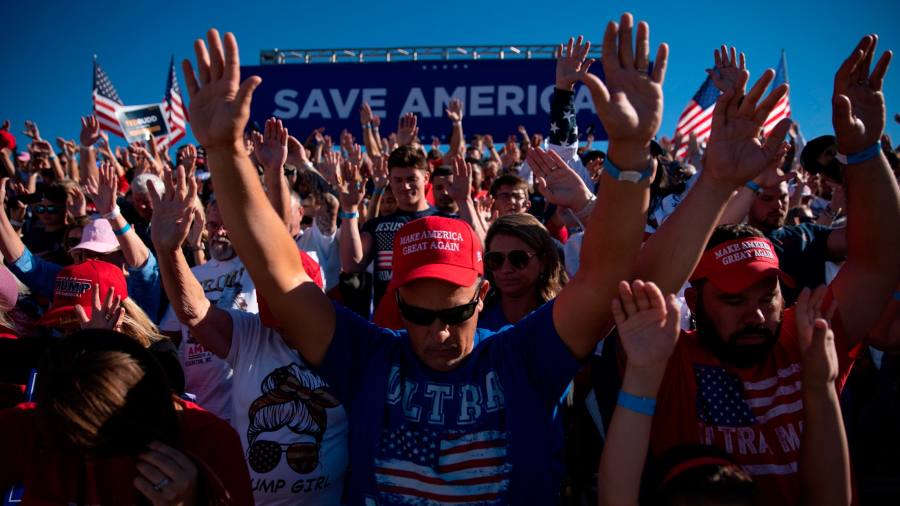It is one of the great contradictions of US politics. How did a thrice-married former casino owner, who bragged on tape about groping women, end up winning over evangelical Christians?
Yet Donald Trump won 76 per cent of the white evangelical vote at the last election in 2020, according to Edison Research exit polls, and at a recent campaign stop in Iowa he insisted he retained the “total support” of church leaders.
“We have a real love fest with the faith leaders of Iowa and the faith leaders throughout the country,” the former president told a local television station earlier this month after meeting local pastors in Des Moines.
About a third of Americans identify as evangelical or “born again” Christians, but they wield outsized influence in the early nomination contests that will shape the race to become the Republican party’s presidential candidate. About two-thirds of Republican participants in the 2024 Iowa caucuses are expected to be evangelical churchgoers, who are likely to make up a similar share in the GOP primary contest in South Carolina, another early voting state.
All of Trump’s rivals will try to break his hold on the voting bloc this week at a three-day event in Washington being organised by the Faith and Freedom Coalition, an organisation that lists among its principles “respect for the sanctity and dignity of life, family, and marriage as the foundations of a free society” and that was instrumental in drumming up support for Trump in 2016 and 2020,
According to some evangelical leaders, Trump’s rivals could win their backing and with it the early momentum that might allow competitors to chip away at his huge polling lead. According to a CNN survey this week, Trump is backed by 47 per cent of Republican voters nationwide. No one else comes close.
Michael Demastus, a pastor at the Fort Des Moines Church of Christ who attended the recent meeting with Trump in Iowa, described him as a “force of nature” who deserved credit for appointing conservative judges as well as moving the US embassy in Israel from Tel Aviv to Jerusalem, another evangelical priority.
But Trump is wrong to claim he has the “full support” of evangelical leaders, said Demastus, who has in recent weeks prayed with several other Republican contenders, including Florida Governor Ron DeSantis, former vice-president Mike Pence and Tim Scott, the senator from South Carolina.
“I think there are some that are strong Trump supporters, but there are many who are like . . . we are kind of ready to hear from other people, too,” he added.
Ralph Reed, a lobbyist and founder of the Faith and Freedom Coalition, also said the race was wide open. “President Trump is clearly the frontrunner and that should not come as a big surprise . . . but this is going to be a highly competitive process,” said Reed, who added that all contenders would get a “fair hearing” at the upcoming event.
Trump’s first presidential pitch to evangelicals in 2016 got off to a shaky start after be bungled a biblical reference to Paul’s second letter to the Corinthians. Weeks later, he lost the Iowa caucuses to Texas senator Ted Cruz.
But he eventually won them over, and their support only solidified after he entered the White House and made good on his claim to be the “most pro-life president ever”, appointing three conservative justices to the US Supreme Court and paving the way for Roe vs Wade, the decision that enshrined a constitutional right to abortion, to be overturned.
Several of Trump’s rivals have made connecting with conservative Christian voters a big part of their pitch.
As he launched his campaign in Iowa earlier this month, Pence repeated a line that he has used often throughout his political career: “I am a Christian, a conservative and a Republican, in that order.”

Scott’s official campaign slogan is “faith in America”, and earlier this week, the senator said he was “excited to . . . talk with caucus-goers who wear their faith on their sleeves and hold Jesus in their hearts” at an upcoming evangelical conference in Iowa.
But analysts are sceptical evangelical voters will be won over by the candidates’ personal faith or character traits. Robert Jones, founder of the Public Religion Research Institute, said that after Trump’s first election, polling showed evangelicals who once identified as “values voters” now cared less about the candidate’s morality and personal attributes.
“There has been a real shift in a political ethic, from one of principle, which says we are going to ask candidates about their character and we are going to judge them all by that metric . . . to really a kind of ‘ends justify the means’ political ethic,” he said.
Reed described Pence as a “close friend” and “as effective a messenger to the [evangelical] community as we have ever seen”, with an “extremely powerful” personal faith story. But he added: “That is not mandatory to do well in this constituency, as Donald Trump amply demonstrated.
“It is not that they don’t appreciate if you share their faith, they do. But they are primarily concerned with whether or not you share their public policy positions.”
Read the full article here




